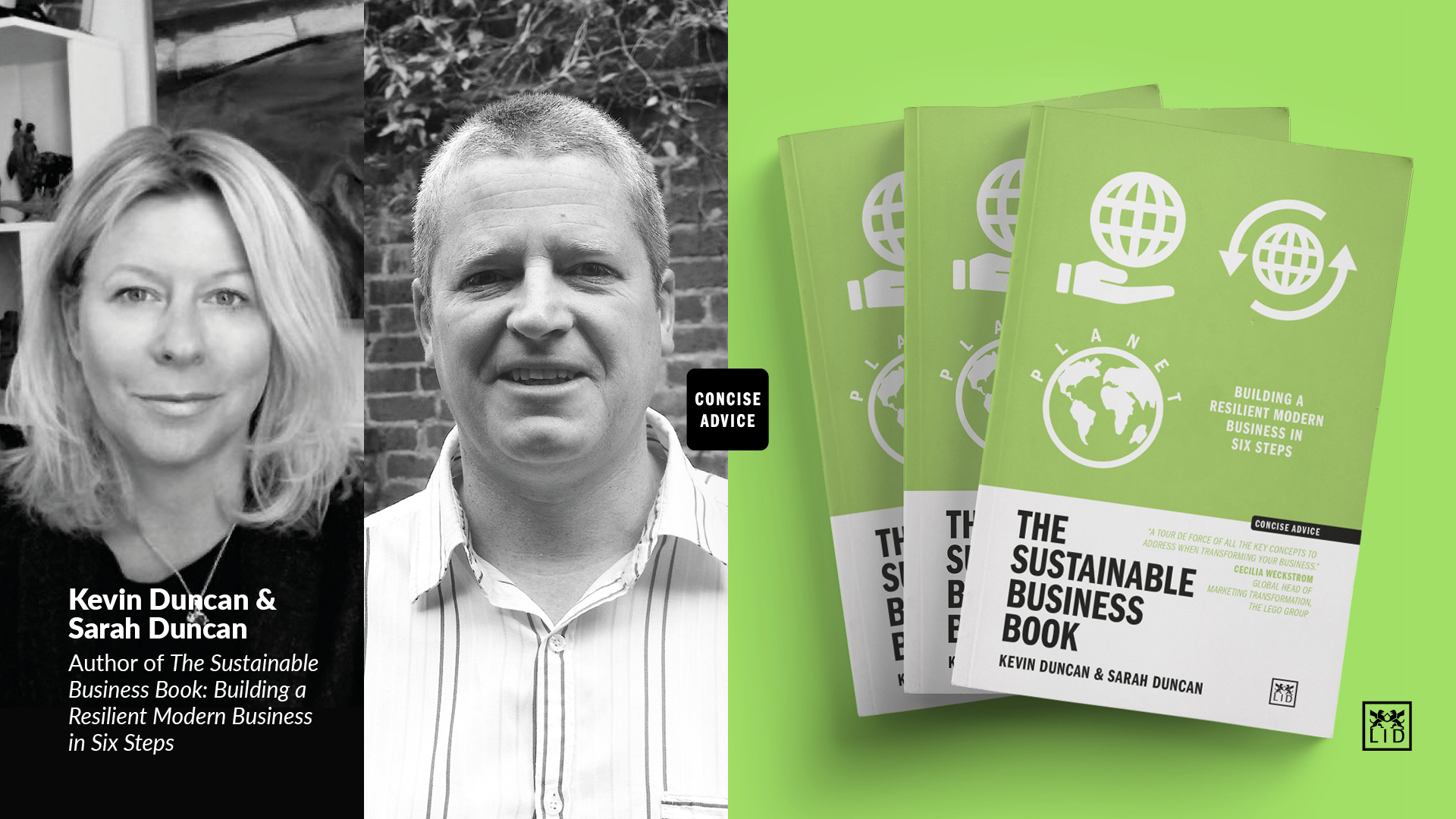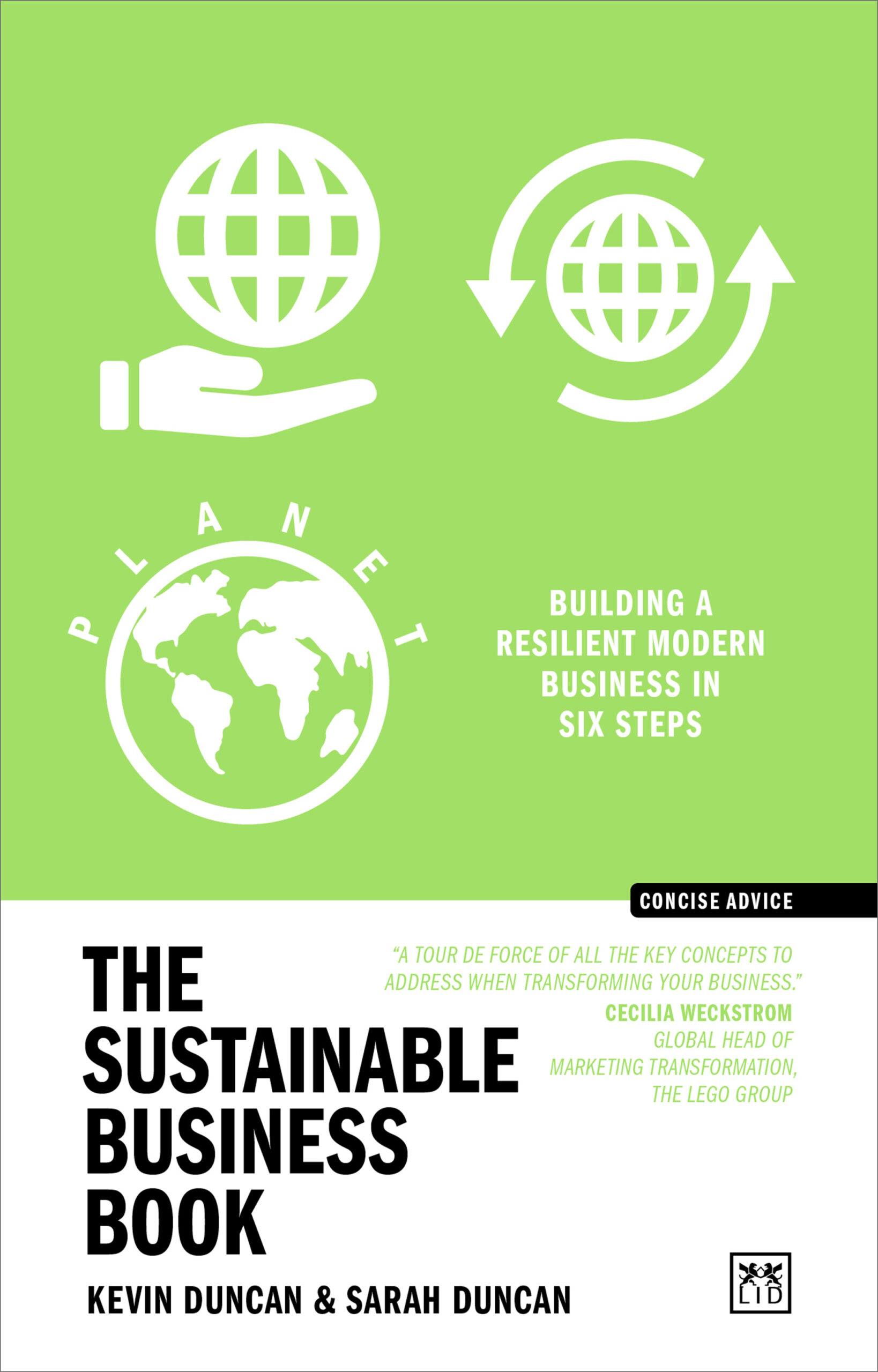|
Marketing with a conscience with Kevin Duncan and Sarah Duncan
Marketing with a conscience with Kevin Duncan and Sarah Duncan

By Guest Contributors Kevin Duncan and Sarah Duncan
Authors of The Sustainable Business Book, Kevin Duncan and Sarah Duncan, reveal what role more conscience consumers and marketing play in building a more sustainable business.
If we look back over the years, there’s little doubt that some blame can be placed at the door of marketing for its contribution to our current environmental and societal issues – from unhealthy lifestyles, obesity and debt to low self-esteem, poor mental health, materialism and general overconsumption.
Creative thinking and the art of persuasive communication have led many people to buy many products that they neither need nor really want.
But there is a big difference between marketers simply trying to do the best they can with a bad brief (or no brief) and marketers consciously manipulating the truth. Whatever the circumstances, the net result is that marketing helps companies sell more of their stuff (good or bad).
But marketers also have the skills to educate and encourage sustainable behaviour – from the boardroom to the shopping trolley – by clearly articulating the financial benefits of corporate sensitivity to people and the planet, and by championing the responsible use and disposal of products at the end of their life (or usefulness).
In order to do this, marketing needs to become the conscience of the business and a force for good, not just a PR tool.
An important role of a conscientious marketer is to understand and reflect the changing views and nature of target audiences. We have talked a little already about the rise in conscious consumerism – people wanting to be seen to be greener and using their purchasing power to buy goods and services that reflect their values and environmental sensitivity.
But it’s not just full-on eco warriors you need to bear in mind. Companies may well be underestimating how many of their customers are only just starting to feel compromised by their current purchasing behaviour. The conflicted consumer sits somewhere between the ego warrior and the eco warrior (Figure 1). They appear to be extremely loyal – regularly purchasing products without, it would seem, any complaint. They like the quality, familiarity, price and convenience of a product but are conflicted about other more ethically dubious elements of the brand – anything from single-use plastic packaging to tax avoidance. The lack of a better alternative, however, keeps them coming back. The question is, for how long?

As these customers’ environmental and societal awareness increases, so will their resentment at feeling that they have no option other than to buy an ethically questionable product or service.
The very moment a competitor brand matching yours for quality, price and convenience comes onto the market showing a clear purpose and commitment to better, more sustainable business practices, switching will be easy. And, even without this simple alternative, the longer the resentment builds, the more likely the customer will be to change their purchasing behaviour anyway, being unable to assuage their growing ethical conscience.
Marketing has a responsibility to recognize and understand these changing motivations. It should provide an invaluable feedback loop that helps ensure that sustainability issues are reported back to the board and therefore treated with the seriousness they deserve.
Marketing also has a moral responsibility to avoid greenwashing. The term greenwashing was reportedly first used by an American environmentalist and researcher called Jay Westerveld. In 1986 he visited a beach resort in Samoa and was dismayed by the resort’s claim that its innovative adoption of a reusable towel service was a way to save the environment. It was a classic overclaim – particularly since the resort was ambitiously expanding right next door in a highly non-environmentally friendly way. Some basic definitions:
Whitewashing: An attempt to stop people finding out the true facts about a situation.
Brainwashing: An attempt to make people believe something by repeatedly telling them that it is true and preventing any other information from reaching them.
Greenwashing: An attempt to make people believe that a company is doing more to protect the environment than it really is.
Whether mildly deceptive or intentionally manipulative, the term has now spawned many different variations. Greenwashing is now rife. Brands use words to mislead, but also visuals and graphics. Green claims are often deceptively vague (and therefore unprovable). Many are overstatements or exaggerations about how environmentally friendly the product, company or service is. Some simply leave out or mask important information, using selective transparency and making a claim sound far better than it is.
One tactic is to use pseudo-scientific terms such as eco or bio – they sound impressive but in many cases are essentially meaningless. Another is a form of symbolic corporate environmentalism, which involves offering up seemingly impressive statistics that have been taken out of context. For example, Company X announces a $300 million investment in ‘natural ecosystems’ as part of a strategy to take action against climate change, while simultaneously investing $25 billion in non-renewable oil and gas energy sources.
With increased consumer scrutiny, more and more businesses are now being exposed for greenwashing. Sometimes, it is simply a case of perfectly good products that genuinely do help society or the planet using naive or lazy claims. At its worst, though, there are bad companies or brands (such as those directly involved with fossil fuels or deforestation) that use marketing claims to mislead and to make their product look acceptable.
In 2022, the Competition and Markets Authority in the UK introduced its Green Claims Code to help combat greenwashing. To avoid investigation, companies must be able to answer Yes to a series of questions, including:
- Are your claims clear and unambiguous?
- Do they only make fair and meaningful comparisons?
- Have you substantiated your claims?
For more details, visit greenclaims.campaign.gov.uk.
The UK’s Advertising Standards Authority has also published rules and guidance about misleading environmental advertising. For more details visit www.asa.org.uk.
From The Sustainable Business Book by Kevin Duncan & Sarah Duncan
ABOUT THE AUTHORS
 Kevin Duncan is a business adviser, marketing expert, and bestselling author. His books have been translated into over a dozen languages. He is the author of The Diagrams Book, The Ideas Book, The Excellence Book, The Smart Thinking Book, The Business Bullshit Book, The Intelligent Work Book, The Bullshit-Free Book and The Sustainable Business Book (all published by LID).
Kevin Duncan is a business adviser, marketing expert, and bestselling author. His books have been translated into over a dozen languages. He is the author of The Diagrams Book, The Ideas Book, The Excellence Book, The Smart Thinking Book, The Business Bullshit Book, The Intelligent Work Book, The Bullshit-Free Book and The Sustainable Business Book (all published by LID).
 Sarah Duncan is a sustainable business development and ethical marketing consultant. She has been in business for over 30 years and set up her own consultancy, Sleeping Lion, in 2005. She now helps businesses navigate their way through the world of business ethics and sustainability with advice, support and bespoke workshops. She is the author of The Ethical Business Book (LID).
Sarah Duncan is a sustainable business development and ethical marketing consultant. She has been in business for over 30 years and set up her own consultancy, Sleeping Lion, in 2005. She now helps businesses navigate their way through the world of business ethics and sustainability with advice, support and bespoke workshops. She is the author of The Ethical Business Book (LID).
Suggested Reading
 All businesses today face increasing pressure from customers and legislation to improve their sustainability credentials. Moreover, companies’ employees and shareholders are demanding the same. Yet, many companies are playing catch-up and urgently need to get on track for the future. This book explains how companies – small or large – can do that in a series of practical stages.
All businesses today face increasing pressure from customers and legislation to improve their sustainability credentials. Moreover, companies’ employees and shareholders are demanding the same. Yet, many companies are playing catch-up and urgently need to get on track for the future. This book explains how companies – small or large – can do that in a series of practical stages.
The authors adopt a method that asks a series of questions that then require brutally honest answers to, that then go on to develop guaranteed actions for companies to implement. For any business owner or manager who realize the importance of running a sustainable business, but do not know where to start, this book provides an essential springboard. It all adds up to a roadmap towards the next decade – and for businesses to remain relevant and resilient.
